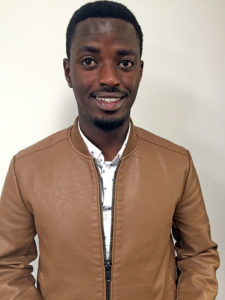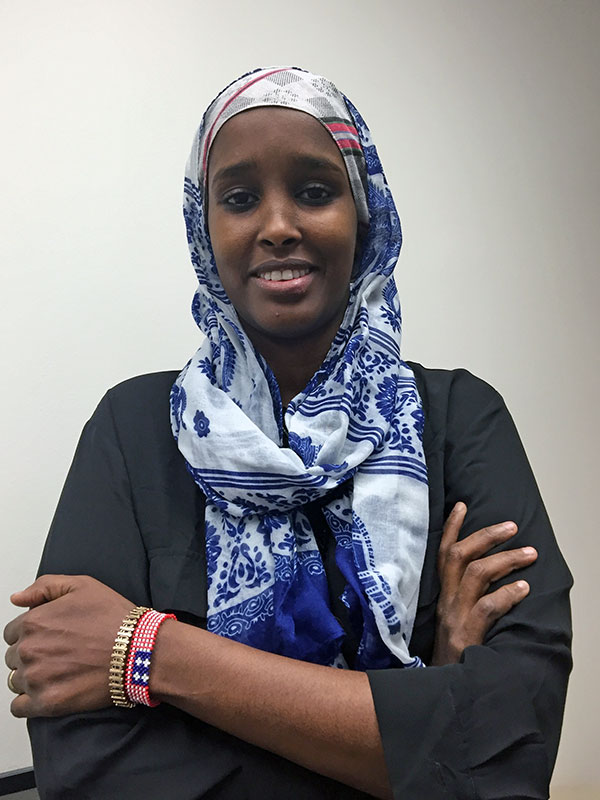Refugees in Columbus, Ohio seek community amidst uncertainty
When a neighbor called to tell him that a suspicious car had been seen driving slowly in front of his house, Sam knew that it was time to leave Baghdad.
About two weeks earlier, as he’d been preparing coffee just after opening his office for the day, two men had entered Sam’s shop and put a gun to his head, demanding that he open the safe. The thieves had taken $41,000 and had demanded that Sam pay them $20,000 every month, or else they would kill his wife and daughters. They already knew his home address and where his children went to school. Sam and his family made preparations to leave Iraq, and they flew to Turkey the day after their neighbor spotted the car.
The building that houses Columbus’s Community Refugee and Immigration Services (CRIS) is located just off Ohio 161 in front of a strip mall. From the outside, it’s brown, boxy, unassuming, but inside, the halls are almost labyrinthine–newcomers require a guide to help them navigate.
Walking these halls, it’s clear that CRIS is not a typical office complex: in the reception area, people dressed in the clothing of their countries, some of it inadequate for the January cold, wait to meet with service workers who will help them integrate into the community; two men with rugs bow toward Mecca, located somewhere beyond the tight corner into which they’ve wedged themselves; a classroom of adult learners work patiently on basic English greetings–”Good Morning,” “Goodnight,” and “See you later.”
The maze of hallways seem a too-convenient metaphor for the journey most refugees take on their way to the United States, as evidenced by only a few of their stories.
Sam and his family spent a “terrible two years” in Turkey in a religiously conservative city where he was not legally permitted to work. Filled with uncertainty about their future, they waited months between immigration meetings and interviews (the final one lasting twelve grueling hours), before being placed in Columbus.
Sowdo, a woman from Somalia facing death threats for her work as a radio journalist, decided to leave because the threats turned toward her family. Two of her colleagues had already been murdered, and her boss killed in a car bombing incident. Sowdo was smuggled into Kenya, then made it to Mozambique, and finally walked into South Africa, where she lived for several years before meeting an Ohio State anthropology professor who encouraged her to come to the United States. It took her a year and a half between applying and arriving here.
 Frank left Uganda to escape violent persecution, and potentially life imprisonment or even death, for being gay. He and his partner lived in a refugee camp for over a year before they could be placed in the U.S., where they struggled to secure sufficient shelter, food, and water because the other refugees ostracized them for their sexuality.
Frank left Uganda to escape violent persecution, and potentially life imprisonment or even death, for being gay. He and his partner lived in a refugee camp for over a year before they could be placed in the U.S., where they struggled to secure sufficient shelter, food, and water because the other refugees ostracized them for their sexuality.
When Bhutan’s king instituted a “One Nation, One People” policy in the late 1980s, a policy that has since been categorized as ethnic cleansing, 80,000 Bhutanese-born citizens of Nepali-descent were forced to leave their home country and flee to refugee camps in southeastern Nepal. Jhuma, in his late teens at the time, and his family were forced to live in a camp under distressing conditions for 21 years, only leaving after 15 rounds of failed negotiations between Bhutan and Nepal made immigrating to a third country the only option. “We were victims of Bhutan’s Gross National Happiness,” says Jhuma, wryly.
The refugees who gave me these accounts are only a fraction of those who enter the country every year. The United States admitted 84,995 refugees in 2016 from 79 countries seeking relief from war, torture, extreme health conditions, persecution for religious beliefs or their sexual or gender identity, and other threats to their lives. Refugees are eventually settled in communities around the country, and organizations such as CRIS facilitate their integration–helping them find housing, employment, and some way to call their new country “home.”
 These refugees are often housed in neighborhoods where they live next door to regular Americans, and they find that one of their greatest challenges is building community. But maybe this isn’t surprising when one considers that around 30% of Americans have never interacted meaningfully with their neighbors. Sam says that life is not as easy here as in Baghdad due to this lack of community.
These refugees are often housed in neighborhoods where they live next door to regular Americans, and they find that one of their greatest challenges is building community. But maybe this isn’t surprising when one considers that around 30% of Americans have never interacted meaningfully with their neighbors. Sam says that life is not as easy here as in Baghdad due to this lack of community.
“Here, Americans work, work, work,” he says. “There is no time to meet family or make friends. I haven’t seen my brother-in-law in five weeks, and he only lives half a mile from my house.”
Sam admits he doesn’t know his neighbors. On one side is an American family, and he has only spoken once, briefly, with the mother when they happened to be outside at the same time smoking. On the other side is a hispanic man who doesn’t speak to anyone. This lack of interaction in his Columbus neighborhood is quite different from Baghdad, where Sam would meet friends during the day, and people kept an eye out for each other, like the neighbor who warned him and his family about the car.
When he first moved to his neighborhood, Jhuma’s experience was similar to Sam’s. “People here have to work all the time,” he says. “In Nepal, I alone could support my whole family, but here one person can’t really pay all the rent and bills. There I could go to my neighbor and ask them for something, but here people can’t do that. In my cultural orientation, I was told that I should not expect to know my neighbors, and not to knock on their door or try to talk to them.”
For the first month in his new neighborhood, Jhuma didn’t know anyone. It wasn’t until his and the neighbor’s kids started playing together outside that the adults struck up the conversation that would lead to a mutually-rewarding friendship. Jhuma has become good friends with some of his neighbors, even celebrating Thanksgiving and Diwali with them, and often having tea.
New refugee neighbors are here to stay–conditions back home making it impossible for them to return. Besides, they’re building lives here, and making their way despite the challenges that they face as outsiders. Refugees encounter fear and resistance to their arrival in many Western nations, including the United States, where a core part of our collective identity is being the country that welcomes immigrants. Of course, this identity is complicated, as many groups who have immigrated to the U.S. have experienced discrimination while integrating in their own way, shaping and contributing to the national economy and our rich cultural heritage..
This potential for contributing to the nation’s prosperity is one thing that the refugees with whom I spoke would like Americans to remember when they feel apprehensive about their presence here. Frank told me, “It is not at all the case that people just want to come live here. Usually people are well off in their countries, but because of the situation, they have to leave everything behind. They are hopeless. They are suffering. They cannot look back, and cannot look forward. They have to run for their lives, and they are here because they are looking for peace and security. Refugees are people, and we have capacity, ability, knowledge, wisdom, talent. We have skills to help develop the country in all aspects.”
All of the individuals I interviewed said that, for them, moving to the U.S. was never a goal or even a desire before the incidents occurred that drove them away from their homes, families, and the lives that they’d worked hard to build.
Sowdo told me, “I have friends in refugee camps. They’ve been there five, ten, twenty years. Their kids are born there, they don’t belong anywhere. Tomorrow the refugee camp could burn down and they wouldn’t have anywhere to go. When they come here, they forget all that, they can be settled.” Sowdo herself plans to stay here permanently and will begin applying for citizenship in August.
Right now, President Trump has blocked refugees from entering the U.S., and the status organizations like CRIS ia unclear. According to Joe Recchie, one of CRIS’s board members, “some estimates circulated among resettlement agencies are that up to 50% of all resettlement funding could be cut under the Trump Administration. This means compromising a very efficient volunteer-supported resettlement infrastructure that rapidly trains and places refugees in jobs and educational facilities that enable them to contribute to our society.”
While the Trump administration reframes how the United States will function as a global neighbor, others continue the work. On the day of President Trump’s inauguration, CRIS workers an Iraqi family to Columbus. Just over a week later, protestors gathered at the same airport to denounce the same dictate that seeks to prevent more new neighbors from joining them.
Lizz Stearns is a writer and the associate editor of Between Coasts. She resettled recently in Newark, Ohio, after living and teaching literature in Colorado, New York, and Texas. Originally from Lubbock, Texas. She is currently writing grants for non-profits.

